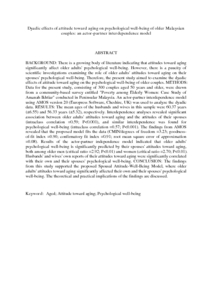Citation
Momtaz, Yadollah Abolfathi and Tengku Abdul Hamid, Tengku Aizan and Masud, Jariah and Haron, Sharifah Azizah and Ibrahim, Rahimah
(2013)
Dyadic effects of attitude toward aging on psychological well-being of older Malaysian couples: an actor-partner interdependence model.
Clinical Interventions in Aging, 8.
pp. 1413-1420.
ISSN 1176-9092; ESSN: 1178-1998
Abstract
BACKGROUND:
There is a growing body of literature indicating that attitudes toward aging significantly affect older adults' psychological well-being. However, there is a paucity of scientific investigations examining the role of older adults' attitudes toward aging on their spouses' psychological well-being. Therefore, the present study aimed to examine the dyadic effects of attitude toward aging on the psychological well-being of older couples.
METHODS:
Data for the present study, consisting of 300 couples aged 50 years and older, were drawn from a community-based survey entitled "Poverty among Elderly Women: Case Study of Amanah Ikhtiar" conducted in Peninsular Malaysia. An actor-partner interdependence model using AMOS version 20 (Europress Software, Cheshire, UK) was used to analyze the dyadic data.
RESULTS:
The mean ages of the husbands and wives in this sample were 60.37 years (±6.55) and 56.33 years (±5.32), respectively. Interdependence analyses revealed significant association between older adults' attitudes toward aging and the attitudes of their spouses (intraclass correlation =0.59; P<0.001), and similar interdependence was found for psychological well-being (intraclass correlation =0.57; P<0.001). The findings from AMOS revealed that the proposed model fits the data (CMIN/degrees of freedom =3.23; goodness-of-fit index =0.90; confirmatory fit index =0.91; root mean square error of approximation =0.08). Results of the actor-partner independence model indicated that older adults' psychological well-being is significantly predicted by their spouses' attitudes toward aging, both among older men (critical ratio =2.92; P<0.01) and women (critical ratio =2.70; P<0.01). Husbands' and wives' own reports of their attitudes toward aging were significantly correlated with their own and their spouses' psychological well-being.
CONCLUSION:
The findings from this study supported the proposed Spousal Attitude-Well-Being Model, where older adults' attitudes toward aging significantly affected their own and their spouses' psychological well-being. The theoretical and practical implications of the findings are discussed.
Download File
![[img]](http://psasir.upm.edu.my/30732/1.hassmallThumbnailVersion/Dyadic%20effects%20of%20attitude%20toward%20aging%20on%20psychological%20well.pdf)  Preview |
|
PDF (Abstract)
Dyadic effects of attitude toward aging on psychological well.pdf
Download (85kB)
| Preview
|
|
Additional Metadata
Actions (login required)
 |
View Item |

